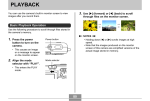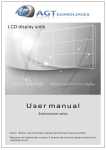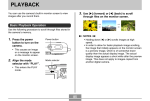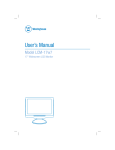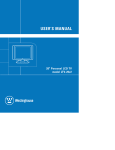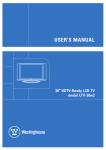Download Westinghouse LCM-15V5 Specifications
Transcript
15” LCD MONITOR Model LCM-15v5 Table of Contents IMPORTANT PRODUCT SAFETY INSTRUCTIONS ...................................................................... 2 CLEANING THE LCD MONITOR ................................................................................................................. 4 SAFETY GUIDELINES ............................................................................................................................... 5 FCC COMPLIANCE STATEMENT .............................................................................................................. 5 INSTALLATION...................................................................................................................................... 6 1. 2. 3. 4. ATTACHING THE BASE STAND TO THE LCD MONITOR .................................................................... 6 CONNECT THE VGA AND AUDIO CABLES ........................................................................................ 6 CONNECT THE POWER CABLE ......................................................................................................... 6 TURN THE POWER ON ..................................................................................................................... 6 OSD MENU FUNCTIONS...................................................................................................................... 7 OSD MENUS ........................................................................................................................................... 8 BACKLIGHT CONTROL...................................................................................................................... 9 DISPLAY MODES ..................................................................................................................................... 9 9IMAGE PROBLEM ........................................................................................................................ 10 NO SIGNAL INPUT ................................................................................................................................... 10 OUT OF RANGE ..................................................................................................................................... 10 APPENDIX ..............................................................................................................................................11 SPECIFICATIONS .................................................................................................................................... 11 TROUBLESHOOTING .............................................................................................................................. 12 No Power.......................................................................................................................................... 12 No Image.......................................................................................................................................... 12 Power is ON but no Screen Image ................................................................................................... 12 “Out Of Range”................................................................................................................................ 12 Fuzzy Image..................................................................................................................................... 12 Image Too Bright or Too Dark ......................................................................................................... 12 Distorted Image................................................................................................................................ 12 Image is Not Centered (size is not scaled correctly)........................................................................ 12 Colors are Not Correct. .................................................................................................................... 12 No Sound.......................................................................................................................................... 12 Mounting the LCD Monitor on a Wall............................................................................................. 13 Additional Questions........................................................................................................................ 13 1 IMPORTANT PRODUCT SAFETY INSTRUCTIONS Read carefully and follow all warnings and instructions in this User's Manual and those marked on the product before you use the monitor. Failing to follow these warnings can result in personal injury or damage to the monitor. Keep this User’s Manual in a convenient location for future reference. Important: Save the original box and all packing material for future shipping needs. Proper Handling of the Monitor Always handle the LCD monitor with care. Avoid touching the LCD screen. Skin oils are difficult to remove. Always position the LCD monitor on a stable and level surface. Unstable surfaces can cause the monitor to topple and fall, resulting in possible damage or injury. Avoid exposing the monitor to direct sunlight or high temperatures, which can damage or shorten its useful life. Do not place it near heat sources such as radiators, heat registers, or other appliances that generate heat. Orient the monitor away from direct sunlight to reduce glare. Avoid exposing the monitor to rain, water, moisture or high humidity. Do not place it near basins or sinks where it may come in contact with water. Never place heavy or sharp objects on the LCD monitor, video cable, or power cord. Overloading Outlets Do not overload electrical power sources when installing the LCD monitor. Overloading wall outlets, circuits, or extension cords can result in overheating, fire, or electric shock. Use only grounded or polarized outlets. Power Cord Protection Minimize wear on the power supply cord. The power supply cord should be routed away from foot traffic and contact with other objects. Do not route the power cord under rugs or carpeting. The cord should never be severely bent, pinched, or twisted. Periodically inspect the power cord and each end of the cord for wear or damage. Unplug and replace the cord if it is damaged. Ventilation Slots and openings on the cabinet are provided for ventilation purposes. To ensure reliable operation of the product and to protect it from overheating, these openings must not be blocked or covered. Keep the LCD monitor a minimum of four (4) inches away from any wall to assure sufficient airflow and ventilation. Increased temperatures may cause fire or device failure. 2 To assure proper ventilation, do not block the openings by placing the monitor on a bed, sofa, rug or other similar surface. Do not place it in a built-in installation, such as a bookcase or enclosed rack, unless proper ventilation is provided. Other Notices and Precautions Caution: Never remove the rear cover. There are no user serviceable parts inside. The LCD monitor contains high voltage parts. You may be seriously injured if you touch them. Do not attempt repairs yourself. The warranty does not cover repairs or attempted repairs by anyone not authorized by Westinghouse Digital. Refer all servicing and repairs to qualified service personnel. If the monitor begins to emit smoke, an abnormal noise, or a strange odor, immediately turn it off and unplug the power cord. Contact the Westinghouse Service Center. If the LCD Monitor will not be used for an extended period of time, unplug the power cord. 3 Cleaning the LCD Monitor • • MAKE SURE THE LCD MONITOR IS TURNED OFF NEVER SPRAY OR POUR LIQUID DIRECTLY ONTO THE SCREEN OR CASE To Clean the Screen: 1. Wipe the screen with a clean, soft, lint-free cloth. This removes dust and other particles. 2. If it still is not clean, use a small amount of non-ammonia, non-alcohol based glass cleaner on a clean, soft, lint-free cloth to clean the screen. To Clean the Case: 1. Use a soft, dry cloth. 2. If it still is not clean, use a small amount of non-ammonia, non-alcohol based, mild non-abrasive detergent on a clean, soft, lint-free cloth to clean the surface. Disclaimer Westinghouse Digital does not recommend the use of any ammonia or alcohol-based cleaners on the LCD screen or case. Some chemical cleaners have been reported to damage the screen and/or display case. Westinghouse Digital will not be liable for damage resulting from the use of any ammonia or alcohol-based cleaners. 4 Safety Guidelines Warning: This device must be operated with the original power supply, part number ADP-60CF A. CAUTION: The power supply outlet should be located near the equipment and should be easily accessible. Use a power cable that is properly grounded. Always use the appropriate AC cord that is certified for the individual country. Some examples are listed below: USA.................UL Switzerland ..... SEV Canada.............CSA Britain ............. BASE/BS Germany..........VDE Japan ............... Electric Appliance Control Act IMPORTANT NOTICE CONCERNING POWER CORD SELECTION The power cord set for this unit has been enclosed and has been selected according to the country of destination and must be used to prevent electric shock. Use the following guidelines if it is necessary to replace the original cord, or if it is not enclosed. The female receptacle of the power cord must meet IEC-60320 requirements and should look like Figure A1 below: Figure A1 Figure A2 For the United States and Canada In the United States and Canada the male end of the plug is a NEMA5-15 style (Figure A2), UL Listed, and CSA Labeled. For units that are mounted on a desk or table, type SVT or SJT power cords may be used. If the monitor is placed on the floor, only SJT type cords may be used. The power cord must be selected according to the current rating for your unit. Please consult the table below for the selection criteria for power cords used in the United States and Canada. Cord Type SJT SVT Size of Conductors in Cord Maximum Current Rating of Unit 18 AWG 16 AWG 14 AWG 18 AWG 17 AWG 10 Amps 12 Amps 12 Amps 10 Amps 12 Amps FCC Compliance Statement This equipment has been tested and found to comply with the limits for a Class B digital device, pursuant to part 15 of the FCC Rules. These limits are designed to provide reasonable protection against harmful interference in a residential installation. This equipment generates, uses, and can radiate radio frequency energy, and may cause harmful interference to radio communications if not installed and used in accordance with the instructions. However, there is no guarantee that interference will not occur in a particular installation. If this equipment does cause harmful interference to radio or television reception, which can be determined by turning the equipment off and on, the user is encouraged to try to correct the interference by one or more of the following measures: • • • Increase the separation between the equipment and receiver. Connect the equipment into an outlet on a circuit different from that to which the receiver is connected. Consult the dealer or an experienced technician for help. FCC Warning: To assure continued FCC compliance, the user must use a grounded power supply cord and the provided shielded cables. Any unauthorized changes or modifications not expressly approved by Westinghouse Digital could void the user's authority to operate this device. 5 Installation Congratulations on your purchase of a Westinghouse 15” LCD monitor. Sleek and practical, this lightweight and wall-mountable LCD monitor delivers a crisp and clear display optimized for 1024 x 768 resolution. Package Contents • • • • LCD Monitor (15”) Detachable LCD Base Stand Cables o AC/DC Power Supply Adapter and Cord o VGA (HD15) Male – Male Cable o 3.5 mm Male – Male Stereo Audio Cable Literature o User’s Manual o Warranty Card 1. Attaching the Base Stand to the LCD Monitor Attach the base stand to the LCD monitor stand neck. Align the holes and tabs; press in and snap into place. To remove the base stand, press the tabs on the bottom of the stand neck and remove the base. 2. Connect the VGA and Audio Cables Connect a VGA cable (to the connector labeled “D-SUB”) and an audio cable (to the connector labeled “LINE-IN”) from the back panel of the LCD monitor to your PC. 3. Connect the Power Cable Connect the DC power adapter cord to the monitor (to the connector labeled “DC-IN”) and then connect the female AC power cord to the adapter. Plug the AC power cord into a properly grounded AC outlet. 4. Turn the Power On Press the power button on the front of the LCD monitor. The LED light will turn green if a signal input is detected or it will be orange if no input is detected. Auto Adjust Although a computer can detect the new monitor with the built-in VESA Plug & Play feature, the Auto Adjust function can be used to enhance the display. To perform the Auto Adjust: Turn on the computer and monitor. Press the “Auto” button to start Auto Adjust. The LCD monitor will perform the Auto Adjust process automatically for 10 seconds and you will notice the image change after it has been adjusted. 6 OSD Menu Functions 1 Power Switch LED 2 Auto 3 Exit/ 4 ┼/ 5 ―/ 6 Menu 7 Turbo Input / Turbo Speaker 8 Power On/Off Power Indicator Green: Normal Orange: Power Saving Off: Power Off Automatically optimizes positions, phase & clock (only when the OSD is not on) Exit the OSD menu OSD selection and adjustment Quick Brightness adjustment OSD selection and adjustment Quick Contrast adjustment Enter the OSD menu Access the OSD sub-menu & selection Quick Brightness switching D-Sub (VGA) All the function settings for the LCD monitor are controlled via the control keys located on the bottom part of the front panel. To display the OSD main menu, press the “Menu” keypad button on the control keys. (Note: The OSD menu display will disappear automatically after approximately 10 seconds, if no action is taken.) The LCD monitor has been adjusted to optimal settings before shipment. Adjustments to the monitor settings can be made using the OSD menu. Press the “Menu” keypad button to display the OSD menu. Press the “+” or “-“ keypad button to select the function to be adjusted. Press the “Menu” keypad button to enter the OSD sub-menu to be adjusted. Press the “+” or “-“ keypad button to change the setting of the function. To exit the OSD menu or go back to the previous action, press the “Exit” keypad button. It automatically will save any changes that have been made. Repeat the steps above to change the setting of other functions. The following is a list of the OSD sub-menus for the LCD monitor. 7 OSD Menu Image Audio Color Language Sub-Menu Description and Function Brightness Adjust the brightness of the screen Contrast Adjust the contrast of the image Clock Adjust the clock pulse of the image Phase Adjust the focus of the image H. Position Move the image left and right on the screen V. Position Move the image up and down on the screen Sharpness Adjust the picture sharpness of lower resolutions Volume Adjust the audio volume Mute Turn on or off audio muting 9300K Set the color temperature to 9300K white color 7500K Set the color temperature to 7500K white color 6500K Set the color temperature to 6500K white color User/Red Adjust red gain User/Green Adjust green gain User/Blue Adjust blue gain English Select the OSD language Français Italiano Deutsch Español 日本語 简体中文 繁體中文 Settings OSD Timeout Adjust OSD display time setting OSD Position Move the OSD display position to one of the following 5 positions within the overall screen. 1 2 3 4 Input Source 5 Auto Setting Adjust clock, phase and positions automatically Recall Restore to factory settings Analog Select Analog input source: 8 Language Selection Color Temp. Selection Volume Adjustment Image Adjustment Settings Input Source Audio Current Status Source Resolution & Frequency Color Temp. Status Input Source Status Backlight Control Display Modes The monitor backlighting can be controlled by using the Turbo button on the keypad. There are 3 modes: Economy, Text and Picture. To toggle between these modes, press the Turbo key until the mode you desire is selected. These modes automatically change the backlighting levels between bright, brighter and brightest. 9 Image Problem No Signal Input If there is no source connected to the monitor, the following error message will be displayed: Out of Range If the monitor settings are not compatible with the PC or out of range of the LCD monitor, the following error message will be displayed: 10 Appendix Specifications Panel Type 15" Color TFT LCD Panel Optimum Resolution 1024 x 768 Response Time 16 ms Contrast Ratio 450:1 Maximum Brightness 370 Nits Viewing Angles 120° (H) / 110° (V) Color Saturation 72% TBD Wall/Arm Mount Physical 75mm VESA® Input Signal Video HD-15 pin mini D-Sub (VGA connector) Audio 3.5mm Mini-Stereo jack male-male Built-in audio amplifier and speakers, 2.5 watts * 2 channels Speaker Output Power Voltage 100-240 VAC, 50/60 Hz (auto switch), 1.5A Operating Conditions Temperature 32° F to +95° F (0° C to +35° C) Humidity 20% to 80% (no condensation) Altitude Up to 3,000 meters Temperature -4° F to +130° F (-20° C to +55° C) Humidity 20% to 85% (no condensation) Altitude Up to 12,000 meters Dimensions Physical 16.1 (w) x 15.9 (h) x 4.9 (d) in Weight Net 5.7 lb (2.6 kg) Storage Conditions Regulations FCC-B, UL, CSA (CUL), Energy Star®, Plug & Play Lamp Life 40,000 hours 11 Troubleshooting No Power • • • Make sure the DC cord is plugged into the back of the LCD monitor. Make sure the AC power cord is securely connected to the AC socket. Plug another electrical device (like a radio) to the power outlet to verify that the outlet is supplying the proper voltage. No Image • • Make sure the power button is ON. Check whether the LCD monitor and computer power cords are plugged in and check the power supply. Power is ON but no Screen Image • • Adjust the brightness and contrast levels. Make sure the VGA cable is securely connected to both the computer and monitor. “Out Of Range” • Check the computer image output resolution and frequency and compare the value with the preset values of the computer’s graphics card. Fuzzy Image • Adjust the Phase setting on the monitor. Image is Too Bright or Too Dark • • • • Adjust the brightness and contrast levels using the OSD. Make sure that the computer is not displaying an irregular image. Check the VGA connection between the computer and LCD monitor. Perform Auto Adjust. Distorted Image • • Reset the LCD monitor by performing the “Recall” function using the OSD. Remove extra accessories (such as a VGA extension cord). Image is Not Centered (size is not scaled correctly) • Perform Auto Adjust. • • Adjust the horizontal and/or vertical position of the image using the OSD. Check the image size setting. Colors are Not Correct • Adjust the color setting using the OSD. No Sound • Check the audio connection. 12 Mounting the LCD Monitor on a wall • • • Check the Westinghouse Digital website for wall mounting solutions. Use the 75mm VESA hole pattern to secure a mounting plate to the LCD monitor. Use professional installation to reduce the risk of injury and damage. Additional Questions • • See our website at www.westinghousedigital.com Contact Westinghouse Digital Customer Service at (866) 287-5555 or write us at [email protected] 13 SE-UM-1502-0501















